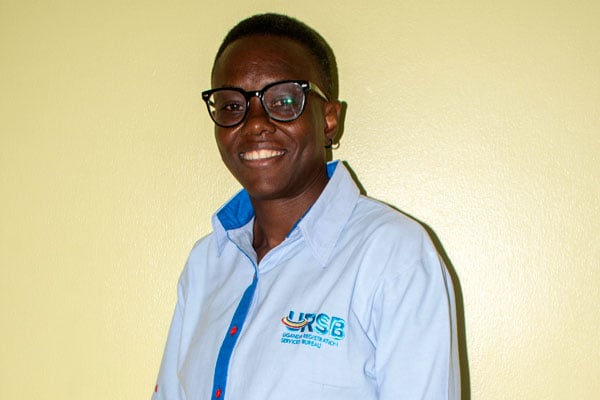Prime
Empower her: Kakooza uses data analytics to boost farming

Ms Carol Kyazze Kakooza, the founder and CEO of Axiom Zorn, a data forensic firm that uses data analytics for agri-tech to offer solutions to farmers. Photo/Courtesy of Carol
What you need to know:
Becoming a leader in the field of data analytics, Carol Kyazze Kakooza says, requires both technical and strategic skills, writes Esther Bridget Nakalya.
Carol Kyazze Kakooza is convinced that women can be good leaders regardless of where they are.
“A woman tends to her garden and comes home to prepare the food because leadership is sprung from the belly of our mothers to be initiators,” she states, explaining that she saw the example of leadership from her mother.
“My mother was hardworking and I could not tell how much she and father were contributing but would see food on the table,” she says, adding that her mother lived up to her expectation of what a woman leader is.
Kakooza is the founder and CEO of Axiom Zorn, a data forensic firm that uses data analytics for agri-tech to offer solutions to farmers. She also leads public relations with Rotary for District 213.
Kakooza emphasises that she is keen on empowering and uplifting other women.
She says: “Sixty percent in my firm are women. Every project is directed to women farmers and addresses issues that affect them such as disability and domestic violence.”
She further explains: “We improve conditions for women farmers by designing projects that enhance their opportunities, facilitation, and training.” She also uses her role to groom young women and urges her partners during donor meetings to recruit more women.
What it takes
Becoming a leader in the field of data analytics, Kakooza says, requires both technical and strategic skills.
She explains: “It requires taking action through strategic thinking, problem-solving skills, and the capacity to identify opportunities for innovation and optimisation.”
One also needs to be willing to embrace new technologies and integrate data analytics with other emerging technologies.
This includes the adoption of artificial intelligence (AI) and machine learning (ML) algorithms for more advanced data processing and predictive analytics, Kakooza advises.
All this, she says, needs to be done promptly to help one make swift decisions since the field of data analytics is dynamic.
Kakooza can attest to the benefits of having such skills because of the results they have brought her.
She lists some of her achievements as winning at the Alpha Pitch Competition during the 10th Africa Fintech Summit held in Lusaka, Zambia; coming third in the Aurora Women Award, a worldwide technology award; and getting the Newcomer Innovator of the Year award by the Global Innovation Foundation in Nepal.
Another highlight was securing significant financial backing from RABO Bank, which she explains they lent to farmers, achieving a remarkable 92 percent recovery rate.
“This success highlighted the value of effective leadership in driving positive outcomes,” she says.
Crisis management
When it comes to managing crises, Kakooza admits that she has faced many, but has been able to take them on.
“Life has thrown a lot of curve balls at me but somehow I was born for them,” she expresses.
When a crisis is on her hands, she attends to it by “upholding composure, fostering tranquility, and ensuring transparent communication with my team and promptness”.
Her advice for leaders is to be agile and adapt strategies that suit organisational objectives.
She tips: “The solutions should be attainable and the damage repairable. The crisis should be viewed as a catalyst for growth and innovation.”
She admits that it has not been easy all the time: “Leading a multinational team across seven countries presented unique challenges in managing diverse cultures and skill sets.”
However, she says she resolves this by fostering a collaborative environment where each one feels valued.
Age, she adds, can be an issue. “When you are younger than the people you are managing, it is challenging to convince them.”
However, she notes that it can be exciting as she has been able to see many facets of implementation at a high level.
She has also turned her challenges into opportunities while battling her children’s ailments as a mother.
“My son has autism but is doing well in life and my twin girls recovered from sickle cell disease after I took to research,” she reveals.
Her son, she proudly mentions, has paintings sold online and recently released his first video game with over 1,000 players all over the world. Kakooza believes in taking risks to improve. She remembers some of the big ones she has taken.
“One significant risk involved challenging the status quo by leveraging data analytics for financial gain, despite initial skepticism. This venture paid off, demonstrating the transformative potential of data-driven solutions,” she says.
However, she adds “not all risks yield immediate success. Venturing into uncharted territories, such as implementing data-centric strategies in underserved communities, posed challenges.”
These experiences taught her the importance of resilience and adaptability in navigating uncertainties.
She advises fellow leaders to embrace calculated risks, grounded in thorough research and strategic planning, and to also turn failures into opportunities.
Mentorship
Looking back Kakooza believes that the schools she attended helped shape who she has become. Her education background she says, was a training ground that has seen many of her peers become successful.
“I attended Nabisunsa Girls School for my secondary where I learnt to be an independent woman and a leader,” she says.
While there, she came to understand her purpose in life as a young woman.
“We were given pass marks which made it very competitive,” she adds.
In addition to the school that taught her, her parents exhibited good work discipline and this, cultivated in her a strong work ethic, purpose, resilience and determination.
Today, Kakooza leverages her experiences to inspire women by sharing practical insights while encouraging them to excel in leadership roles.
Her leadership journey she says is guided by principles of faith and spirituality. She grew up in a staunch Catholic home and says she is guided by humility, compassion, and integrity to make work judgements and solve challenges.
For those who want to succeed in leadership, Kakooza has some advice. The challenge has always been she says, that women are not easily heard or seen. However, she encourages women to be brave, focused and understand that they are destined for greatness because they can reproduce, expand and lead.
“Women need to stand out and speak out but also make sure they are articulate and understood so that their point is acted upon,” she states.
She also cautions women on always having mood swings and encourages them to instead analyse and understand concepts through reading.
Women, she adds, ought to, “network, proactively seek growth opportunities, prioritise self-care and maintain a healthy work-life balance.”
What you didn’t know about Carol Kyazze Kakooza
Carol Kyazze Kakooza pursued a Bachelor of Arts in Mass Communication at Makerere University.
She worked at her first job as a news anchor at Media Plus, a news agency.
She later joined Uganda Telecom as an accounts relationship manager and pursued qualifications in Cisco Certified Network Associate (CCNA) and Cisco Certified Network Professional (CCNP) and eventually Information Technology.
She also pursued a Master’s degree in Management of Information Systems.
She has worked for World Vision under the Vision Fund and Grameen Foundation as a partner development specialist.
Favourite roadside snack?
Roasted gonja.
Last movie you watched?
Beekeeper.
Latest book read?
The Book of Joy by 14th Dalai Lama and Desmond Tutu.
One talent you wish you had?
Multilingualism or playing piano.
Favourite colour and why
Cream or white because they look elegant.





